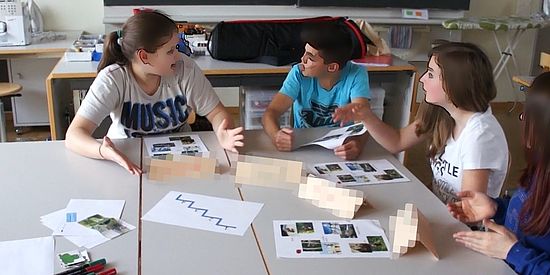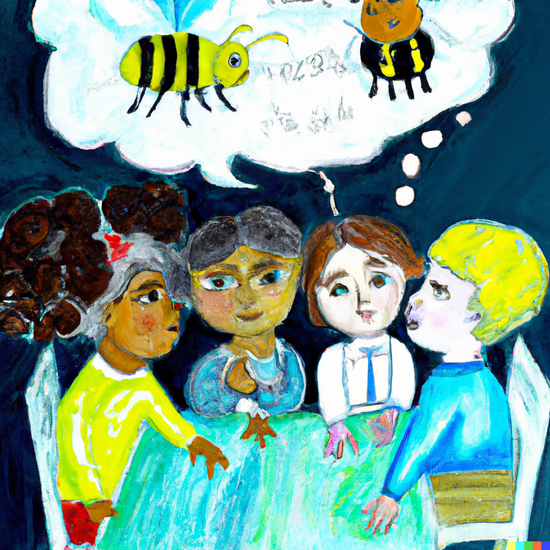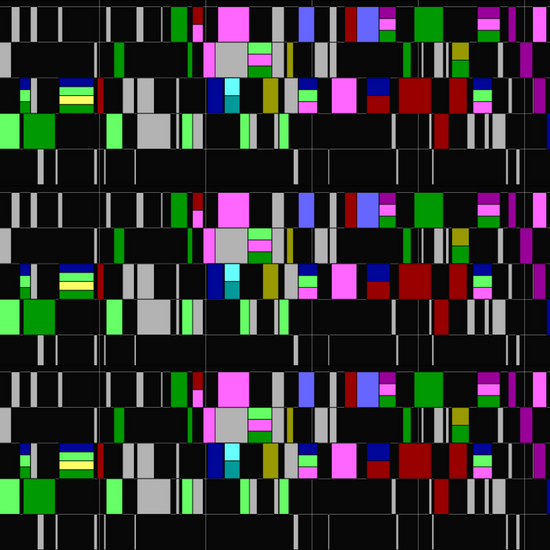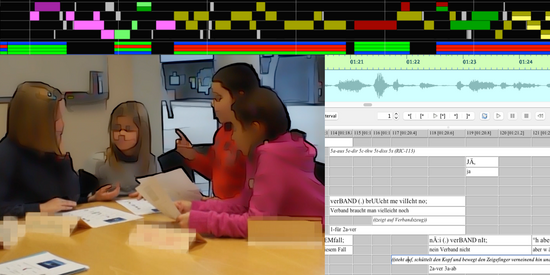
SNF project: Levels of oral argumentation skills among school children (KompAS)
SNF project: Levels of oral argumentation skills among school children (KompAS)
The project "Levels of oral argumentation skills among school children (KompAS)" investigates how German-speaking Swiss school children argue orally and how argumentative conversational skills change in a comparison of age groups. In this context, 180 conversations of a total of 720 Swiss-German school children from grades 2 to 6 are examined in a conversation-analytical way.
The project asks whether and how the children initiate argumentation, whether and how they give reasons, what kinds of reasons they give, how they mark agreement and disagreement, or how they increasingly realize complex argumentation together. Based on the analysis of individual examples, central features of oral argumentation in all conversations are coded and subsequently evaluated with statistical methods; the development of graphical procedures also makes it possible to visualize structures of conversation processes, thus supporting the analyses and revealing new aspects.
Due to the broad data base, the innovative combination of qualitative and quantitative analyses for the individual grade levels (2, 4, 6) makes it possible to describe competence levels by means of typical competencies and strategies (but also their range); these can be used for didactic purposes.
The project includes three subprojects:
- Analysis of the jobs, pragmatic means and forms in the context-sensitive processing of argumentation-specific jobs, taking into account their processing; qualitative-quantitative reconstruction of corresponding class-related levels of competence (project, Oliver Spiess)
- Context-sensitive analysis of argumentative topoi used; qualitative-quantitative reconstruction of corresponding peer cultures and reconstruction of competence levels based on corresponding repertoires and context sensitivity, interactive success of different topoi (dissertation project, Tamara Koch)
- Visualization and quantitative analysis of sequentiality, dynamics and complexity; exploration of corpus data and quantitatively based reconstruction of competence levels of oral argumentation(habilitation project, Daniel Müller-Feldmeth)
Here you can get a sneak peek into the data using an R shiny app. The app is a prototype and will be successively extended during the course of the project. https://argcomp.shinyapps.io/baselargVis/
News
| Workshops / conferences |
| 14.-16.11.2024: Concluding conference project KompAS "Perspectives on Argumentation in Context: Interactional Skills, Logical Structures and Methodological Advances", University of Basel. (Martin Luginbühl, Tamara Koch, Oliver Spiess, Daniel Müller-Feldmeth) -> Program |
| 26.6.24: Panel "The Role of Common Ground in Argumentation (Analysis): Reconstructing the Obvious?"4th Argumentation & Language (ARGAGE) Conference, University of Fribourg. (Martin Luginbühl, Tamara Koch, Oliver Spiess, Daniel Müller-Feldmeth) |
| 27.10.23: Meeting of the experts, project KompAS, University of Basel |
| Publications |
| Koch, Tamara. 2024. “Gemeinsam argumentieren”, in S. Bietenhard, C. Brönnimann, H. Schnüriger (eds.)Fachdidaktische Zugänge Ethik, Religionen, Gemeinschaft mit Bildung für Nachhaltige Entwicklung. Ethik. Bern: hep, pp. 39-46. |
| Schmidlin, Regula, Luginbühl, Martin, Christen, Helen. 2024. “Standard- und Dialektgebrauch bei Schülerinnen und Schülern in der Deutschschweiz. Schulische Erwartungen vs. gesellschaftliche Praxis”, zeitschrift für den deutschunterricht in wissenschaft und schule, (3), pp. 31–43. |
| Judith Kreuz, Martin Luginbühl. 2024. "Demonstrating consensus in argumenative settings: Co-constructions in children's peer discussions." In European Journal of Psychology of Education. |
| Martin Luginbühl, Regula Schmidlin. 2024. "'Müemer jetz würklich Hochdütsch rede?' Sprachwahl und Sprachwechsel in schulischen Gruppengesprächen", in Standarddeutsch und Dialekt in der Schule. Bern: hep Verlag (Mündlichkeit), pp. 106–134. Available at: https://doi.org/10.5281/zenodo.10417170. |
| Presentations |
| 11.15.24: Gut(e) Gründe geben: Herausforderungen in der Ausbildung mündlicher Argumentationskompetenz. Ringvorlesung „Sprachkompetenzen im Lebensverlauf“, University of Basel. (Martin Luginbühl, Oliver Spiess) |
| 9.9.24: From Collection to Publication: Managing and Sharing Children's Argumentation Data (Data Pitch). CLARIN-CH Day 2024, University of Neuchâtel. (Martin Luginbühl, Oliver Spiess) |
| 26.6.24: Shared Knowledge About Uncertainty as an Aspect of Common Ground: Reconstructing Practices of Coping with Knowledge Gaps in Children’s Oral Argumentation. 4th Argumentation & Language (ARGAGE) Conference, University of Fribourg. (Martin Luginbühl, Tamara Koch, Oliver Spiess, Daniel Müller-Feldmeth) |
Project video
Subprojects
Data
For our analyses we have the extensive KompAS corpus at our disposal, which was created in the SNF project Argumentative Gesprächskompetenz in der Schule: Kontexte, Anforderungen, Erwerbsverhäufe (Argumentative Conversational Competence in School: Contexts, Requirements, Acquisition Trajectories) and further processed in the current project. The corpus comprises 180 conversations among four school children each in grades 2,4, and 6 from German-speaking Switzerland. The participants worked on one of two decision tasks without the presence of adults. The conversations were recorded with two cameras each, and are transcribed according to GAT2 standard, translated into standard German and extensively annotated. In addition, the data have been transformed in an ISO-TEI compliant manner and will be made available to the scientific public during the course of the project. Using the browser-based application baselargVis based on R-shiny, the data can already be explored.
People
| Prof. Dr. Martin Luginbühl | Project management |
| Dr. Daniel Müller-Feldmeth | Project staff, coordination |
| Tamara Koch | Project assistant, doctoral student |
| Oliver Spiess | Project assistant, doctoral student |
| Chantal Wanderon | Former project staff member |
Publications
Koch, T. (2024) “Gemeinsam argumentieren”, in S. Bietenhard, C. Brönnimann, H. Schnüriger (eds.) Fachdidaktische Zugänge Ethik, Religionen, Gemeinschaft mit Bildung für Nachhaltige Entwicklung. Ethik. Bern: hep, pp. 39-46.
Schmidlin, R., Luginbühl, M. and Christen, H. (2024) “Standard- und Dialektgebrauch bei Schülerinnen und Schülern in der Deutschschweiz. Schulische Erwartungen vs. gesellschaftliche Praxis”, zeitschrift für den deutschunterricht in wissenschaft und schule, (3), pp. 31–43.
Kreuz, J. and Luginbühl, M. (2024) “Demonstrating consensus in argumenative settings: Co-constructions in children's peer discussions”, European Journal of Psychology of Education. Available at: https://doi.org/10.1007/s10212-024-00840-7
Luginbühl, M. and Schmidlin, R. (2024) “«Müemer jetz würklich Hochdütsch rede?» Sprachwahl und Sprachwechsel in schulischen Gruppengesprächen”, in Standarddeutsch und Dialekt in der Schule. Bern: hep Verlag (Mündlichkeit), pp. 106–134. Available at: https://doi.org/10.5281/zenodo.10417170.
Müller-Feldmeth, D. et al. (2023) “’Yes, we’re done’ - ’except Ricardo’: Using speech, body and artefacts to perform inclusion and exclusion in peer discussions”, Research on Children and Social Interaction, 6(2), pp. 230–266. Available at: https://journal.equinoxpub.com/RCSI/article/view/23791.
Luginbühl, M., Müller-Feldmeth, D. (2022) “Oral Argumentation Skills between Process and Product”, Languages, 7(2), p. 139. Available at: 10.3390/languages7020139. edoc | Open Access




